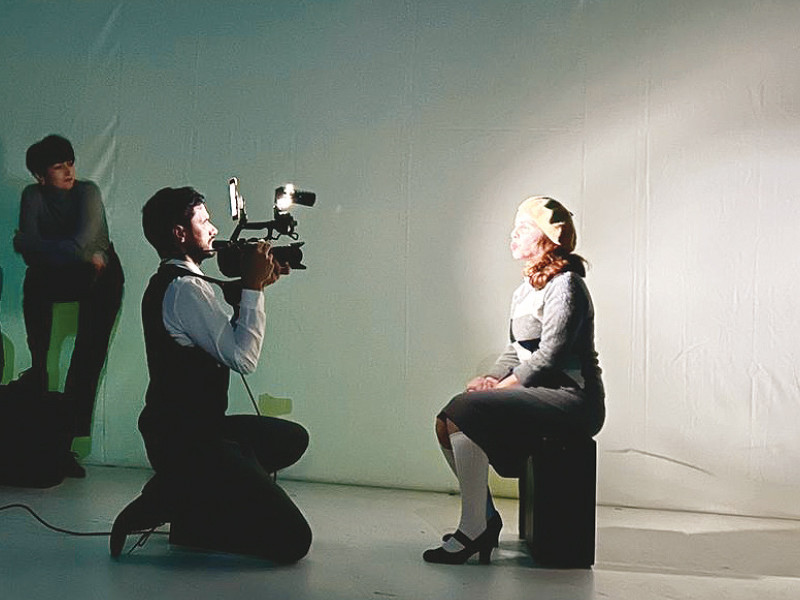
Humans. For sale is the title of a play by Romanian playwright and theater director Carmen Lidia Vidu about a little-known chapter of German–Romanian relations that saw the government of West Germany buy the freedom of about 220,000 ethnic German Romanians from Romania’s communist regime between 1969 and 1989.
The German State Theater in Timisoara (DSTT) brought the play to Germany, staging it in Berlin and Timisoara’s twin city, Karlsruhe. “This deal is unique in recent European history,” director Carmen Lidia Vidu told DW.
People exchanged for money and goods
Ethnic Germans known as the Transylvanian Saxons and the Banat Swabians came to what is now Romania in the 12th and late 17th centuries respectively. During the 24 years of Nicolae Ceausescu’s rule (1965–1989), many of these ethnic Germans wanted to escape the poverty and oppression of the communist dictatorship and move to West Germany.
The regime in Bucharest realised the potential involved and effectively sold its German minority to West Germany for hard cash. The details of the deals and the extent of this human trade only came to light more than 20 years after the collapse of communism.
Secret negotiations in Cologne and Bucharest
Working on behalf of the West German government was Christian Democrat lawmaker Heinz Günther Hüsch, who kept all his dealings with the Securitate — Romania’s communist-era secret police force — carefully under wraps. Bucharest insisted that the deal remain secret and threatened on a number of occasions to break off negotiations.
Hüsch, who died in October 2023, regularly met Securitate officers either in the Romanian capital or in Cologne to negotiate the number of Romanian Germans who would be allowed to leave Romania every year and the sum that Bonn, which was the seat of the West German government, would pay Bucharest.
Germany paid an estimated DM 2 billion to resettle ethnic German Romanians
The size of the payment for each Romanian German fluctuated over time and was mainly defined by Bucharest on the basis of the person’s skills and qualifications. Although a definitive sum was never actually revealed, it is estimated that West Germany paid Romania about DM 2 billion (about €1 billion or $1.07 billion in today’s money). This was in addition to numerous loans and goods that the Ceausescu regime demanded in return, such as limousines, medical technology and bugging devices.
Taking advantage of people’s misery
But it didn’t end there: Ethnic Germans who wanted to move to Germany were forced to pay bribes to Securitate officers to get the papers they needed to leave Romania. The money had to be in foreign currency, even though Romanian citizens were strictly forbidden to hold such money. As a result, many had to borrow from friends and relatives in Germany. Then there were those, who promised to either accelerate the process — or at least not to sabotage it — in exchange for hard cash.
Bringing history to life
on stage
Director Carmen Lidia Vidu made a name for herself in Romania with documentary plays about the bloody 1989 overthrow of the communist regime, cities and towns during the Ceausescu dictatorship and the hopes and problems of today’s youth. Her productions are multimedia.
Humans. For sale is based on extensive research in the Securitate archives, interviews with historians and secret service experts, West Germany’s chief negotiator Heinz Günther Hüsch and Securitate officer Stelian Andronic.
Vidu also spoke to Romanian Germans who were themselves directly involved. Extracts from these interviews and television documentaries from the Ceausescu era are integrated into the play. Hüsch’s family and some of the ethnic Germans who came to Germany also speak of this dark chapter in German–Romanian relations either in the form of video extracts or live acting.
The play also highlights the fate of people who either emigrated through legal channels or fled. For example, one character talks of how his father suffocated while trying to flee Romania in a tank.
The long-term impact of
the deals
Should one negotiate with dictators? How much is a human life worth? Can people be saved if they are treated like goods? Did the deals struck by Bonn and Bucharest sound the death knell for about 800 years of German culture in Romania? How did the Romanian Germans fare in their new country? How did their departure affect their ethnic German neighbors and relatives who stayed in Transylvania and Banat? These and other questions are addressed in Vidu’s play.
Vidu is in absolutely no doubt that Hüsch had the best interests of this ethnic group at heart. “Heinz Günther Hüsch really wanted to help these people,” she told DW. “I was touched by his humanity.”
The challenges of performing abroad
“Going on a foreign tour is challenging — both for the DSTT and probably any other minority theater group — because you only have a limited audience back home,” Lucian Varsandan, the ensemble’s manager, told DW. Varsandan said that performing in Germany was particularly special for the group, which was curious to know how a German audience would respond to the subject matter.
Great interest in post-performance discussion
Many audience members in both Romania and Germany could relate to Vidu’s play because either they or their relations hailed from Romania. The play was a resounding success in Germany, with demand for tickets in Karlsruhe so great that additional seats had to be brought in. The performance in Berlin on June 14 was sold out despite the fact that it coincided with Germany’s opening fixture at Euro 2024.
In Berlin — as in Karlsruhe and Timisoara — there was great interest in the post-performance discussions. Romanian Germans in the audience told their stories, while people who had nothing to do with the events at the time had questions and were keen to know more.
Both the play and the discussion highlighted the ongoing pain experienced by those who lost their home and their roots when they left Romania. In Berlin, television journalist Hanni Hüsch, daughter of West Germany’s chief negotiator, shared her memories of her father’s involvement and of her lasting interest in both the subject and in Romania. “In a way,” said manager Varsandan, “the post-performance discussion was a continuation of the performance itself.”



1731550446-0/Polymarket-(1)1731550446-0-165x106.webp)

1729512368-0/liam-(8)1729512368-0-165x106.webp)











COMMENTS
Comments are moderated and generally will be posted if they are on-topic and not abusive.
For more information, please see our Comments FAQ